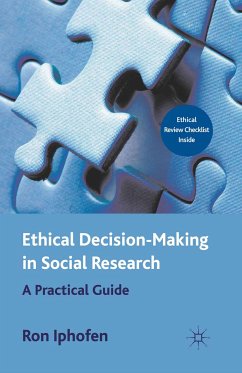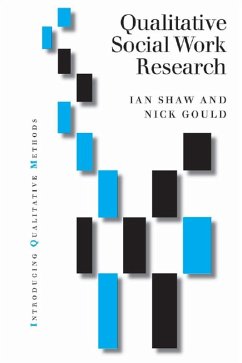

PAYBACK Punkte
36 °P sammeln!






This practical, user-friendly guide examines ethics in research. It helps researchers to manage ethical dilemmas that arise while research is being planned, conducted and reported and includes a unique 'ethical review checklist', as well as other useful features, to aid ethics in practice.
Dieser Download kann aus rechtlichen Gründen nur mit Rechnungsadresse in A, B, BG, CY, CZ, D, DK, EW, E, FIN, F, GR, HR, H, IRL, I, LT, L, LR, M, NL, PL, P, R, S, SLO, SK ausgeliefert werden.
RON IPHOFEN Social Scientist and until recently Director of Graduate Studies in the School of Healthcare Sciences, Bangor University, UK. He has been Vice Chair of the Social Research Association where he was responsible for updating their ethical guidelines and currently convenes their forum on research ethics. He was scientific consultant on the European RESPECT project and advised the Scottish Executive Social Research on procedures for ethical review. Other advisory roles include: UK Government Social Research Unit, UK Parliamentary Office of Science and Technology, National Disability Authority (Ireland) and the National Centre for Social Research. He is co-author of Sociology in Practice for Healthcare Professionals.
Produktdetails
- Verlag: Palgrave Macmillan UK
- Seitenzahl: 250
- Erscheinungstermin: 26. Januar 2016
- Englisch
- ISBN-13: 9780230233768
- Artikelnr.: 44926562
'A brilliant book that covers a lot of territory and provides the reader with ample references to further explore many of the intriguing topics raised . It provides great value for the researcher, student and policy maker. Dr. Iphofen's book goes far beyond the formulaic rules of ethics committees, and yet provides a practical guide for researchers and ethics committee members.' - Joan Sieber, Editor-in-Chief, Journal of Empirical Research on Human Research Ethics (JERHRE)
'This is a pellucid, comprehensive and, most of all, practical guide to resolving the inevitable ethical dilemmas involved in human research. Its key message is that methodological rigour and innovative research outcomes are not incompatible with ethical
'This is a pellucid, comprehensive and, most of all, practical guide to resolving the inevitable ethical dilemmas involved in human research. Its key message is that methodological rigour and innovative research outcomes are not incompatible with ethical
Mehr anzeigen
soundness: quite the contrary, 'good science' is morally good science.' - Professor Jerome Bickenbach, Queen's University, Canada
'Drawing on a range of knowledge and experience, Iphofen gives a fairly comprehensive view of a rapidly developing field. This is more than an 'ethics primer' for social scientists, but it also avoids too much specialised analysis. It deserves a place in most university libraries and, if Palgrave brings it out in paperback, the shelves of social scientists with specific interest or responsibility for ethics and those whose research tends to raise ethical challenges.'- Nathan Emmerich, PhD candidate in the School of Sociology, Social Policy and Social Work, Queens University Belfast and scholar-reviewer forthe THE
'With the growth in interest in ethical decision -making advice is very welcome. Here it comes in the shape of a down to earth and very readable guide. A mixture of theory, practical advice and case examples this is an ideal book for both those who undertake research and those who commission and use it. And for people on research ethics committees this is a useful and readable account of the stages of research and the ethical issues involved' - Anthea Tinker Professor of Social Gerontology and Chairman of the King's College London Research Ethics Committee
'The book succeeds well in offering good practical advice to social researchers about the ethical dimensions of their work. The advice would also benefit those who would not describe themselves as social researchers analysts; consultants; market researchers; those undertaking service evaluations or audits' - Paul Dolan, Adviser/Research, Birmingham City Council in 'Social Sciences Research Group News' November 2009
'Drawing on a range of knowledge and experience, Iphofen gives a fairly comprehensive view of a rapidly developing field. This is more than an 'ethics primer' for social scientists, but it also avoids too much specialised analysis. It deserves a place in most university libraries and, if Palgrave brings it out in paperback, the shelves of social scientists with specific interest or responsibility for ethics and those whose research tends to raise ethical challenges.'- Nathan Emmerich, PhD candidate in the School of Sociology, Social Policy and Social Work, Queens University Belfast and scholar-reviewer forthe THE
'With the growth in interest in ethical decision -making advice is very welcome. Here it comes in the shape of a down to earth and very readable guide. A mixture of theory, practical advice and case examples this is an ideal book for both those who undertake research and those who commission and use it. And for people on research ethics committees this is a useful and readable account of the stages of research and the ethical issues involved' - Anthea Tinker Professor of Social Gerontology and Chairman of the King's College London Research Ethics Committee
'The book succeeds well in offering good practical advice to social researchers about the ethical dimensions of their work. The advice would also benefit those who would not describe themselves as social researchers analysts; consultants; market researchers; those undertaking service evaluations or audits' - Paul Dolan, Adviser/Research, Birmingham City Council in 'Social Sciences Research Group News' November 2009
Schließen
Für dieses Produkt wurde noch keine Bewertung abgegeben. Wir würden uns sehr freuen, wenn du die erste Bewertung schreibst!
Eine Bewertung schreiben
Eine Bewertung schreiben
Andere Kunden interessierten sich für











